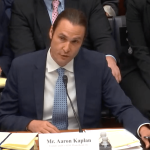From today’s decision by Magistrate Judge Jolie Russo in Cahill v. Nike, Inc. (D. Or.):
Plaintiffs … brought this action seeking class action status alleging that defendant Nike systematically discriminates against them and other similarly situated women regarding salary and promotions…. [A] group of non-party media organizations[] moved to intervene seeking access to those sealed documents…. [T]he Court granted the media organizations’ motion to unredact a number of documents. However, defendant appealed the order, and the Ninth Circuit granted a temporary stay pending the appeal.
On January 25, 2024, plaintiffs’ counsel notified the Court she inadvertently disclosed to an Oregonian reporter (appearing in this action as Advance Local Media LLC) confidential discovery material obtained from the defendant. Despite plaintiffs’ request, Advance Local Media [the Oregonian] refused to return the material. Accordingly, plaintiffs moved this Court for the return of the documents. Given the confidential nature of the material and the Ninth Circuit’s stay regarding the redactions, on January 26, 2024, the Court issued an order requiring the Oregonian to return the inadvertently disclosed confidential material, to not disseminate those materials, and destroy any copies in its possession by January 31, 2024….
This Court initially ordered the Oregonian to return the inadvertently disclosed documents pursuant to Fed. R. Civ. P. 26(b)(5)(B) which requires parties, after notice of a claim of protection, to promptly return or destroy the specified information. The Oregonian asserts it is not a party in this action and has intervened only as a non-party for a limited purpose—albeit for a purpose directly related to unsealing the documents it inadvertently obtained from a party in this case.
After careful review of the record, the Court agrees the Oregonian is not a party to this action for purposes of the protective order. As noted above, the Oregonian intervened as a non-party to unseal records in this case and make them public. Intervention was granted well after the Court entered the stipulated protective order to which plaintiffs’ and defendant agreed. While the Oregonian intervened in this case for the limited purpose of unsealing non-public portions of the record, it did not intervene to challenge or revise the protective order. Moreover, the parties did not seek to alter the protective order to bind the Oregonian to its parameters.
The Oregonian as a limited purpose intervenor to this action lacks the status of a full party. In addition, the Oregonian never joined in the protective order agreement as demonstrated by the enforced lack of access to the sealed documents in the docket. Cf., Univ. of Kansas Ctr. for Rsch., Inc. v. United States (D. Kan. 2010) (finding invalid a provision that binds a non-party to the jurisdiction of the court for purposes of enforcing a protective order). Accordingly, while plaintiffs’ counsel violated the protective order in place in this case, purportedly inadvertently, the Oregonian has not violated any orders to which it is bound. Moreover, the protective order did not restrict “the disclosure or use of any information or documents lawfully obtained by the receiving party through means or sources outside of this litigation.”
To the extent the Court has any authority to direct the conduct of the Oregonian as a case participant, rather than as a party litigant, in its use of the improperly disclosed documents, it must comply with the parameters of the First Amendment. Cf., Seattle Times Co. v. Rhinehart (1984) (“A litigant has no First Amendment right of access to information made available only for purposes of trying his suit.”).
Although, at first glance, it is tempting to conclude that Kish, but for the discovery process, would not have obtained the documents at issue, the Oregonian’s possession of these documents did not involve any Court process emanating from this case. Despite plaintiffs’ counsel’s failure to guard confidential materials in her possession, the Court cannot impute any violation of the protective order to Kish or to the Oregonian.
Accordingly, before the Court can restrain the Oregonian from publishing any information contained in the documents or compel their return, it must determine that this is an exceptional case justifying such prior restraint. Neither defendant, nor plaintiffs, have identified such extraordinary circumstances. At best, privacy concerns of Nike employees and former employees are at stake. And while those interests are significant, they are not sufficient to justify prior restraint on First Amendment rights. See Org. for a Better Austin v. Keefe (1971) (no prior decisions support prior restraint based on the claimed interest of an individual in being free from public criticism of his business practices or free from invasion of privacy).
To the extent Kish was aware the documents were confidential, and that Owens should not have disclosed them based on the protective order, such awareness does not overcome First Amendment protections afforded the Oregonian. See Bartnicki v. Vopper (2001) (“stranger’s illegal conduct does not suffice to remove the First Amendment shield from speech about a matter of public concern”); N.Y. Times Co. v. United States (1971) (declining to enforce prior restraint of publication of illegally acquired information by newspaper’s source). Therefore, plaintiffs’ motion requesting the return of inadvertently disclosed materials is denied….
The post No Clawback of Confidential Discovery Material Inadvertently Disclosed to Reporter appeared first on Reason.com.





